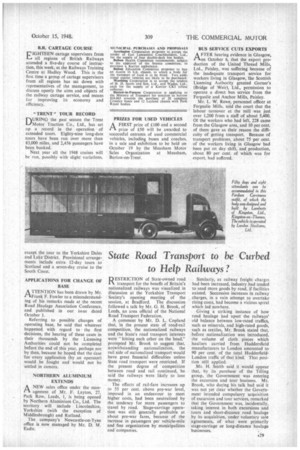State Road Transport to be Curbed
Page 31

If you've noticed an error in this article please click here to report it so we can fix it.
to Help Railways ?
RESTRICTION of State-owned road transport for the benefit of Britain's nationalized railways was visualized in discussion at the Yorkshire Transport Society's opening meeting of the session, at Bradford. The discussion followed a talk by Mr. G. H. Brook, of Leeds, an area official of the National Road Transport Federation.
A comment by Mr. D. L. Copland that, in the present state of road-rail competition, the nationalized railways and the State's road transport interests were " hitting each other on the head," prompted Mr. Brook to suggest that, notwithstanding nationalization, the rail side of nationalized transport would have great financial difficulties unless State road transport were restricted. If the present degree of competition between road and rail continued, he said the railways were likely to lose money.
_ The effects of rail-fare increases up to 55 per cent, above pre-war level, imposed in an endeavour to meet higher costs, had been neutralized by the tendency for more passengers to travel by road. Stage-carriage operation was still generally profitable at about pre-war fares, because of the increase in passengers per vehicle-mile and fine organization by municipalities and companies.
Similarly, as railway freight charges had been increased, industry had tended to send more goods by road, if facilities existed. Successive increases in railway charges, in a vain attempt to overtake rising costs, had become a vicious spiral which led nowhere.
Giving a striking instance of how road haulage had upset the railways' old balance between low-rated traffics, such as minerals, and high-rated goods, such as textiles, Mr. Brook stated that, before nationalization was introduced, the volume of cloth pieces which hauliers carried from Huddersfield manufacturers to London amounted to 90 per cent, of the total HudderfieldLondon traffic of that kind. That position still applied.
Mr. H. Smith said it would appear that, by its purchase of the Tilling group, the Government was entering the excursion and tour business. Mr. Brook, who during his talk had said it was not yet clear whether the Government intended compulsory acquisition of excursion and tour services, remarked that the Government was, incidentally, taking interest in both excursions and tours and short-distance road haulage by its acquisition, tinder voluntary sale agreements, of what were primarily stage-carriage or long-distance haulage businesses.




















































































